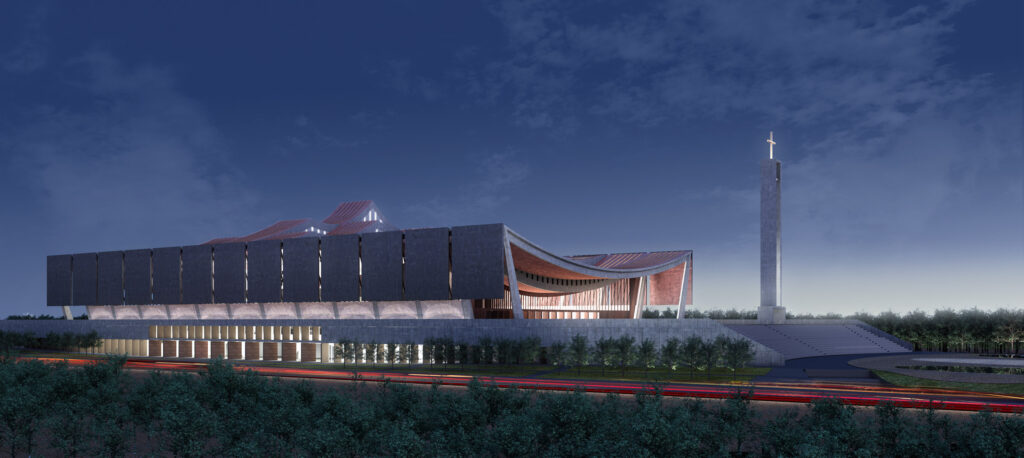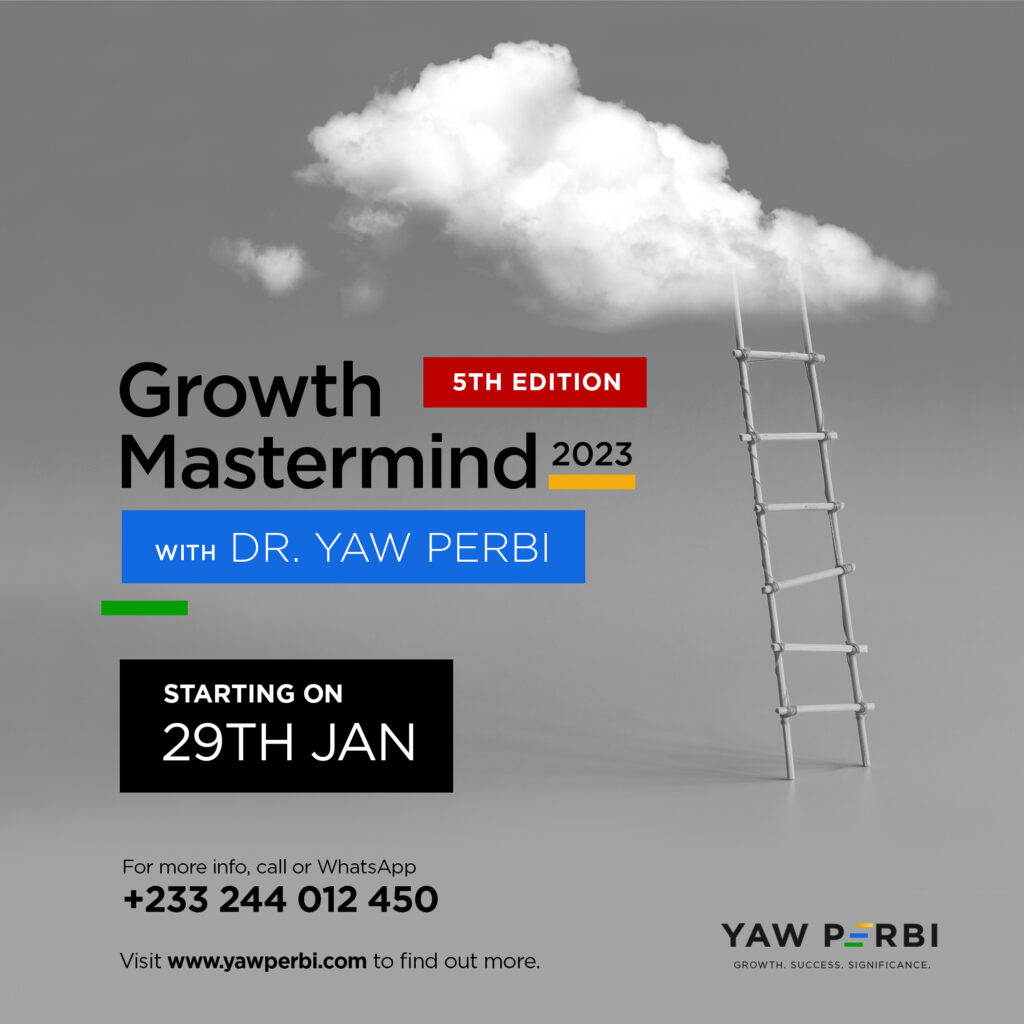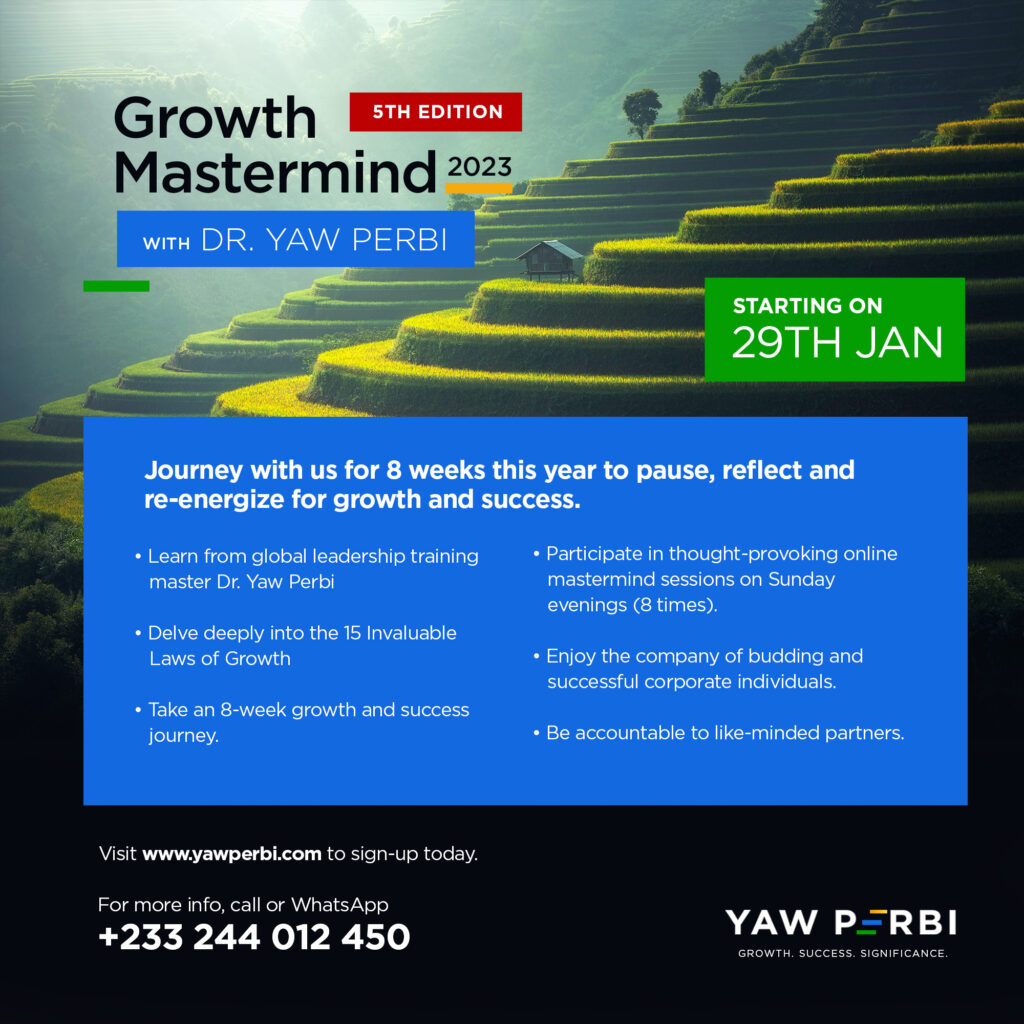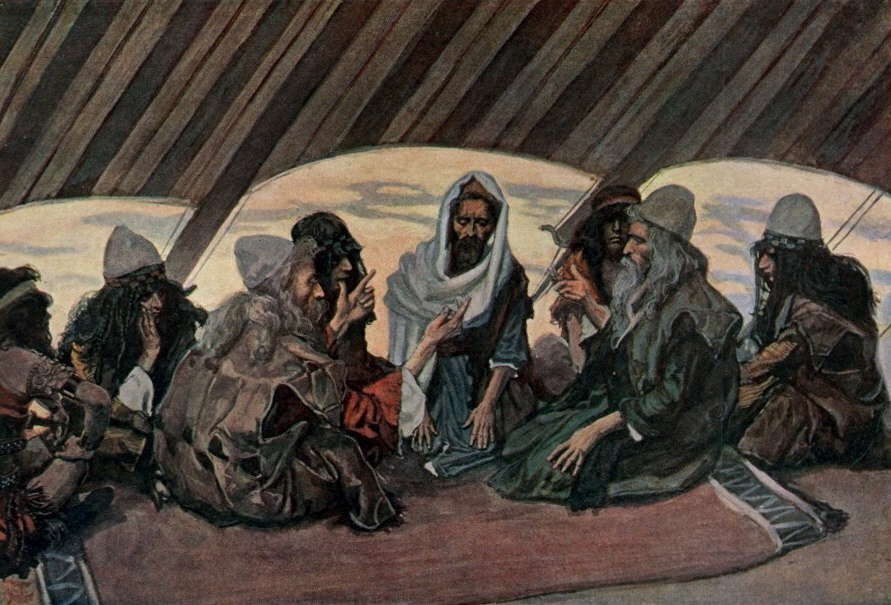
Competence is Character.
Photo credit: Jethro and Moses, watercolor circa 1900 by Jacques Joseph Tissot (1836–1902), courtesy of Wikimedia.
While a lot of #leadership thinking is that leadership comprises #competence AND #character, for others like Jethro of Midian, competence IS character. Discuss.
For the Eager Beaver:
“Listen now to me,” Jethro advised Moses his son-in-law regarding leadership delegation, “Select capable men from all the people–men who fear [revere] God, trustworthy men who hate dishonest gain–and appoint them as officials over thousands, hundreds, fifties and tens” (Exodus 18). Jethro, also known as Reuel, was a Kenite shepherd and priest of Midian.

The Ghanaian Dream is Not What You Think
Just before one of my recent trips out of Ghana, I asked the driver who usually takes me to the Accra airport if he would like to go with me for the experience (he’s never been airborne). His response wasn’t what I expected. I admired him for his brutal honesty and was deeply saddened at the same time. He said, “Dr. P, I won’t lie to you. If I go with you, I’m not coming back.” And he is not alone.
As I’ve been interacting with young people in Accra mainly, but in Ghana generally, it seems the Ghanaian dream is: to get out! i.e. to get out of the country to seek greener pastures. The Ghanaian dream is to exit the nation and l find that so sad on many levels. At the same time that excites me. Let me explain.
THE BAD, SAD & MAD
l find it sad in the sense that whatever the push factors are, they are potent enough to drive a collectivist society that is really keen on kith and kin, in other words one in which friends and family mean so much, to want to leave spouse and children, or parents, to go and struggle in another land just to keep body and soul together. What would make many of our people expire in the wilderness, literally die in the deserts of the Sahara en route to Libya and such, or be buried alive in the Mediterranean Sea between Africa and Europe in desperate attempts to get a better life?
Shame on the fathers and mothers who are making life impossible for our young people. I can totally understand why five hundred (500) years, or even two hundred (200) years ago, we would be forced to get into ships to sail to the Americas but today if anybody brought that same ship people will voluntarily fill it en mass and say, “Take me to the Americas, take me to the Caribbean, take me to Europe, take me to wherever. l want to work for whoever, for whatever; just to get out of here.”
I remember being in a conference last year at Cape Town, South Africa when someone did an incredible presentation on what Ghanaians and other Sub-Saharans go through in wanting to reach Europe by all means, literally. It was revealing how a revived craze is trying to go around the Senegambia coast to the Canary Islands, an Atlantic maritime route largely considered “the most dangerous sea passage for Africans trying to reach Europe.” Regarding the Sahara route, one of the funny but sad question was: “How many Africans can fit into the bucket of a Toyota Hilux pickup truck?” They say, “One more!” One more!! They keep filling and filling and filling these truck buckets with human beings and carry very little fuel and food supplies so they can travel light and transport more people. Whenever there is a breakdown or some delay, people die like flies. The dream becomes a nightmare. O WHY?
THE GOOD
On the other hand, what good can there be in all of this, legitimate and illegitimate attempts at migration alike? Why is there some excitement in my heart? There is titillation because God is a global God and he calls people whenever He wants wherever He wants them to accomplish His eternal purposes. Yes!
One day Paul of Tarsus, the lawyer-turned-preacher, was in Athens, Greece and delivered a ‘TED Talk’ at the Areopagus. Luke the doctor-turned-investigative writer records in parenthesis how “All the Athenians and the foreigners who lived there spent their time doing nothing but talking about and listening to the latest ideas” (Acts 17:21). “Ideas worth spreading,” TED would say. But I digress.
One of the things Paul shared was that God who made us all from one original man, Adam, is the one who determines our boundaries, where we live, and in what period or era in history (Acts 17:26-27). People movements are actually God movements. You see that throughout Scripture, from Genesis to Revelation. A personal attestation to this scriptural reality is how I never wanted to leave the land of my birth, Ghana, to be domiciled in another land, especially outside of Africa. I had no such plans. And I married a woman with a similar mindset. We were doubly resolved. Ironically, my wife, Anyele, was born in Canada and moved to Ghana when she was barely two years old but had no desire to return to the land of her birth. In fact, she had never used that Canadian passport to get back to Canada. Two dozen years later.
One evening in August 2006, God spoke to me so clearly. This was barely three weeks after we were married. I was in a Lausanne Younger Leaders conference near Kuala Lumpur in Malaysia when I heard this in my spirit: ‘It’s my world and l send you where I want you.” Huh! Then in January 2008, the LORD spoke very clearly to us both from Genesis 12. It was just our ‘usual’ morning devotion on an ‘ordinary day’ when these words literally jumped off the pages of scripture: “Leave your country, your people, and your father’s household. And go to a land I will show you.” With no such prior plans of ever leaving Ghana to school or work, in a dramatic fashion our lives were turned upside down. By June I was serving with the United Nations Operation in Cote d’Ivoire (peacekeeping soldier) as a military captain and medical doctor to the U.N. staff and troops mainly, and some local Ivorians. By July, Anyele had been ‘kicked out’ of Ghana too to Montreal, Canada, going to pursue her master’s in economics at McGill University. The first time she was back in two-and-a-half decades.
So that’s the exciting part, that God may be calling people to fulfill His grand purposes in the Arab States, Europe, in another Africa country, the Americas, Australasia… wherever. But l pray that we would be able to help those who are going to go well. And also let our contacts in their destinations receive them well. It behoves on the Church in Ghana, in particular (which accounts for over 70% of the population), to find a way to prepare people well, including blessing them with a healthy diaspora missiology, so they may go well and thrive. It cannot be overemphasized that merely getting to America, Europe or China, is no guarantee one will be successful. We give money to poor people in Canada. There are homeless beggars who have come to squat on our property in America. And the poor in the West are not of only one colour of skin.
Having said that, surely we can do more, much more, to help whoever longs to, or is called to, stay in the land of their birth and make it in Ghana, Nigeria or anywhere in Africa, to be able to make it well also, and very well for that matter.
WHAT’S BEST FOR YOU
Find out what God’s great purpose and plan, position and place (including geographical location) is for your life, for the One who made and redeemed you is a global God. It might not be what you thought. Bottomline: You are only going to prosper where God has purposed and planned you to be planted. Make sure you are planted by God in that place–whether it is in Africa or elsewhere–and in that particular period, where and when you will prosper. Think on these things.
Post Script
Here’s a PEP Talk on ‘The Bad & Good about the Ghanaian dream.’
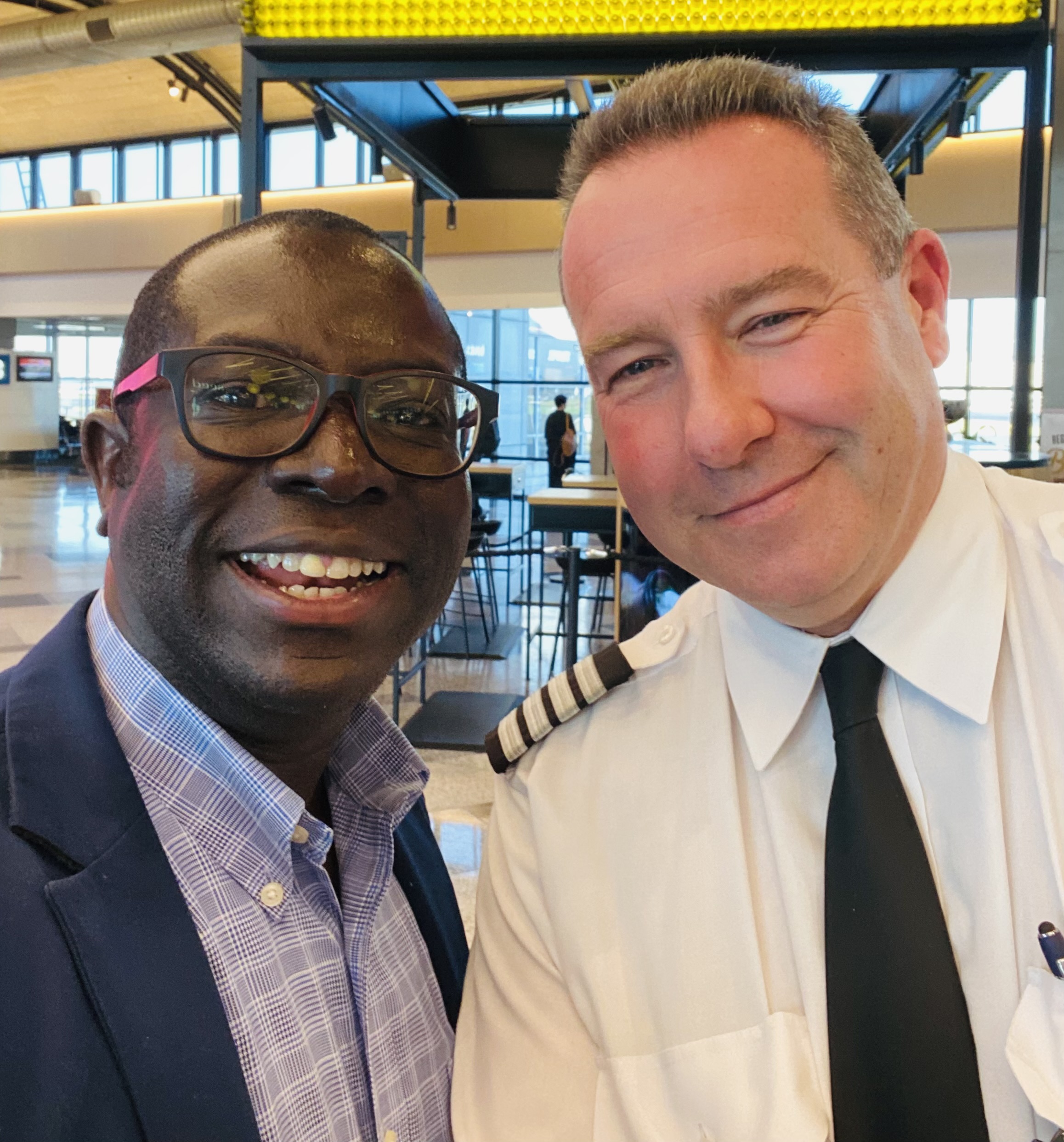
The Pilot and the Preacher.
Call me weird but the smoothest airplane touchdown of my life, today, is my most precious birthday gift. This was Melbourne to Sydney on Jetstar JQ502. I couldn’t help but literally clap my hands in my wing seat (I have said my autobiography just might be titled “Wingman;” I’m almost always flying on the wing!). A few others applauded too. Then as we deplaned and I approached the cockpit I noticed the captain who had performed the magic had his door open and was standing right in front of it, interacting with some passengers. Again, I couldn’t pass by without verbalizing my appreciation of his masterly act. “That was a great landing, sir,” I blurted out. The captain half-smiled, almost embarrassingly, and managed to mutter under his breath his appreciation of my applause.
On the jet bridge a sense of regret began to creep over me. Ah! I should’ve asked to take a photo with him! A little weighed down by that remorseful thought I still, slowly but surely, made my way into the terminal and headed for the place people empty their bladder. Guess who I spotted when I returned to a cafe in the terminal to grab some breakfast: the first officer of the flight, looking to make a purchase. And the captain! Yipeee!
I was happy to repeat my admiration and appreciation and ask for his name and a selfie this time. He graciously obliged. So I gave him some context: over the last eight days I had taken 10 flights–Accra to Amsterdam, to Detroit, to Montreal, to Toronto, to Houston, to Auckland, to Gold Coast, to Adelaide, to Melbourne and now to Sydney–and no landing could compare. I could’ve had a hot cup of tea sitting on my lap during that landing and it wouldn’t have spilled!
WHAT DO YOU DO?
By the time I had shared my itinerary above with Captain Phil Peatfield, he had to ask: “What do you do?” To which I immediately responded, “I am a preacher.” Usually in the marketplace context I would mention something more relatable like leadership consultant or executive coach but it felt so good to say “I am a preacher,” even if it meant I would be canceled (as in today’s ‘cancel culture’). “I used to fly preachers around,” Captain Peatfield responded, to my surprise. Apparently he served with Flying Doctors Australia, a non-profit organisation that “provides emergency and primary health care services for those living in rural, remote and regional areas of Australia who cannot access a hospital or general practice due to the vast distances of the Outback.” I didn’t tell him I’m a doctor too. And well, that I was once a captain as well, a military one.
The irony is that as a little boy I had really wanted to be a pilot. I was fascinated by planes and impressed with pilots’ uniforms. I was starry-eyed when I saw my professor-grandfather’s itinerary as he jet set around the globe lecturing on African ethnomusicology. In a moment of annoyance at a friend in junior high who wanted to be a pilot too (he was too enthusiastic about it for my liking) I snapped out of it and decided becoming a medical doctor would be the way to go.
“PEARL OF GREAT PRICE”
As I celebrate my forty-fifth birthday today, as a preacher I am thankful for this unexpected pilot gift from God. Educationists like Parker Palmer encourage parents to take seriously what early manifestations and proclamations their children make about what they want to do when they grow up. Palmer says in, “Before I can tell my life what I want to do with it, I must listen to my life telling the who I am. I must listen for the truths and values at the heart of my own identity, not the standards by which I must live–but the standards by which I cannot help but live if I am living my own life.”*
As I think of that thing that was triggered in me whenever I heard about or saw my grandpa flying the world, I think of Parker Palmer as a grandfather today.
Watching my granddaughter from her earliest days on earth, I was able, in my early fifties. to see something that had eluded me as a twenty-something parent: my granddaughter arrived in the world as this kind of person rather than that, or that, or that. She did not show up as raw material to be shaped into whatever image the world might want her to take. She arrived with her own gifted form, with her shape of her own sacred soul. Biblical faith calls it the image of God in which we are all created. Thomas Merton calls it true self. Quakers call it the inner light, or ‘that of God’ in every person. The humanist tradition calls it identity and integrity. No matter what you call it, it is a pearl of great price.*
Now that I know what I know, I’m eagerly looking out for what my children, nephews and nieces and young mentees were born to be. God creates no one for nothing. We need to find the clues and lead people in the way they should go–they way they are bent.
BORN FOR THIS
I now know that traveling the world was my calling, even from childhood, although I didn’t get my first plane ride till my late teens. But when it rained it began to pour so much that by age 18/19 I had been to every continent in the world except Australasia/Oceania. What a birthday present to have finally made it ‘down under’ to New Zealand and Australia, a quarter of a century later. And it wasn’t being a pilot or physician that brought me here. It’s the preacher I was born to be. Even the pilot was impressed by the preacher’s itinerary. “Wow, what do you do?” The clue all along was that I was born to travel the world preaching the gospel and raising leader-labourers for the Kingdom of God. I know now that I wasn’t meant to be in the cockpit per se but to enjoy the ride and views–the planes’ and the Lord’s.
Whether a pilot like Peatfield or Perbi the preacher or physician, Palmer’s point is one worth profoundly pondering: “Before you tell your life what you intend to do with it, listen for what it intends to do with you. Before you tell your life what truths and values you have decided to live up to, let your life tell you what truths you embody, what values you represent… Is the life I am living the same as the life that wants to live in me?”* Good food for thought on my birthday.
Reference
*Palmer, Parker J. 2015. Let Your Life Speak : Listening for the Voice of Vocation. San Francisco, Calif: Jossey-Bass.
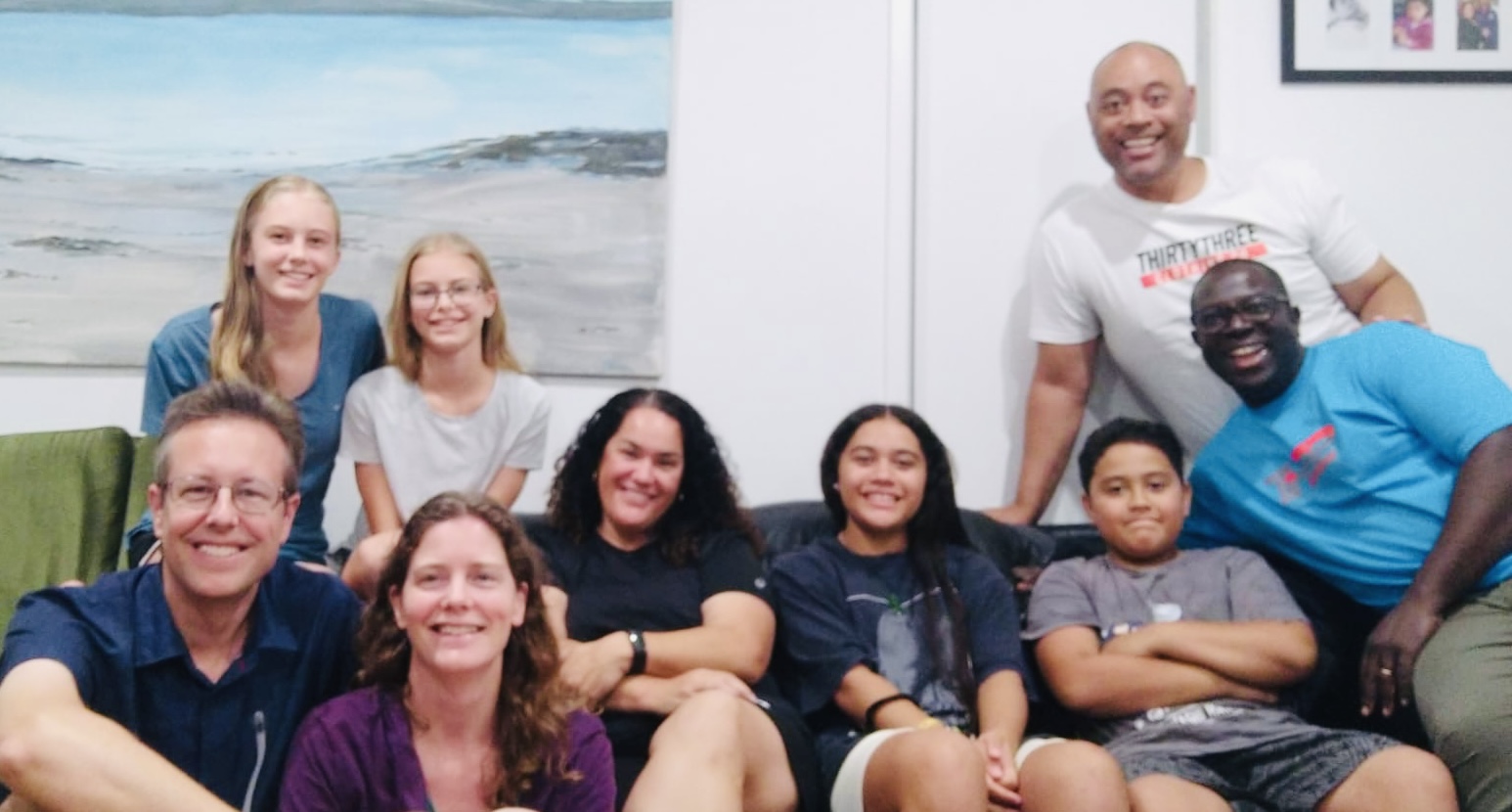
You may have my bag but not my friends.
An exhortation on not allowing circumstances and people who know no better rob you of the wealth of intercultural relationships in our diverse, complex and globalized world.
MYSTERY OF THE MISSING BAG–WHY ME?
I was the last one to walk out of the airport arrival hall at Gold Coast in Australia. I had all the customs and immigration officers to myself, nearly a dozen, yet I gave them absolutely nothing to do. I not only had nothing to declare, I had no bag! Apparently, my only checked-in bag on the three-and-a-half hour NZ 179 flight from Auckland, New Zealand to Gold Coast, Australia had never been loaded onto the plane in the first place. I had waited and waited in vain for it until when nearly everyone on this very full flight had left the baggage hall and Carousel 6 was literally bare, I approached the Baggage Counter to complain about my missing travel companion.
The chap at the Air New Zealand counter was very nice but his assumption that I was going to be in Gold Coast ‘forever’ fascinated me (I’m surprised I wasn’t annoyed).
“Oh sorry sir but your bag will be delivered to you at home tomorrow,” said he.
“Tomorrow? Who told you I’ll still be here tomorrow,” I quizzically retorted.
It was obvious he felt he was doing me a great favour by offering me special at-your-door delivery but I was not amused. Not only did I need the items in my bag today; I was not going to be in Gold Coast in the morrow. This was a 24-hour meet and greet and off to Adelaide, another two-and-a-half hour flight to the western half of the Australian subcontinent.
By now my mind had begun to formulate various plausible permutations why I alone (for I saw no one else approaching the Baggage Counter to lodge a complaint) had my bag delayed. Why me? What was so unique about me that my bag would be singled out for NOT delivery? The only other thing I knew made me different was that I was the only Black African on the flight. Did this have to do with anything?
Interestingly, as I passed through the Auckland airport earlier I had taken a photo in front of the All Blacks memorabilia shop and tweeted “I wonder why I feel so #welcome. #AllBlacks vs #WhitesOnly. How the times have changed–this one, for the better. #NewZealand rocking it!” Did someone spot that and nab me? Was I too quick to praise New Zealand for progressive race relations? Did this bag saga really have anything to do with my Black skin at all? It is easy to read racism into nearly everything once you’ve been a victim of that dehumanizing attitude and act, I must admit. I resist that. I resent that, even.
MYSTERY OF INTERCULTURAL RELATIONSHIPS–SO WORTH IT
All those thoughts and feelings totally dissipated once I set eyes on the last two people left in the welcome area: Julia and Billy-Jo, two of my special friends from the 1997 cohort of the World Vision Youth Ambassadors! Sooo worth the hustle! I had had the privilege of being a World Vision Youth Ambassador for Ghana in 1996 and had the additional honour of returning in Julia and Billy-Jo’s year as a staff intern, together with Claudia from Colombia.
Julia had represented Canada back then and for her, this was our third in-person meeting since 1997 (Prague 2015, Ottawa 2021 and now Gold Coast 2023). But Billy, I had not seen in-person at all since our teenage years! Billy-Jo (yes, she was the first lady I met called Billy–she was way ahead of the gender conversations today!) was the Youth Ambassador from New Zealand. Again, the first Pacific Aboriginal I had ever met, a beautiful Maori, inside and out. Billy’s since become a senior nurse, married to Matt (great guy!) with whom she has three children and migrated to Australia. Interestingly, both Julia and Billy-Jo’s husbands are called Matt. Julia’s Matt is American while Billy’s Western Samoan.
What an incredible day of food, fellowship and fun we had all day, at home and at the Burleigh Beach. The unadulterated love, the open-hearted learning, the deep laughter… What a precious gift we received from Dr. Jerry and Mama Ruth Chang of World Vision Taiwan a quarter-of-a-century ago, a gift that keeps giving, even today.
Now I’m glad our children are getting to know each other as well. The gift ripples on. Just before my family permanently headed to Ghana after a dozen years of being resident in Canada, Julia’s two girls and my brood had a whole day together at their home, right outside of Ottawa, Ontario. In fact, even in the midst of the jamboree we made a WhatsApp video call to Ghana for my older girls to say “hi” to their Canadian sisters. And now that I’ve met Bella and Asher, Billy’s last two (the oldest is away playing rugby and doing school in New Zealand), we have already started conversations about getting them to visit Ghana!
MYSTERY OF INTERDEPENDENCE
Friends, that’s how it ought to be. People are people, made in the image and likeness of their divine Creator, and made to link up with that source, live, love, learn, and lead, leaving a good legacy. Becoming a World Youth Vision Youth Ambassador was a life changing experience–50 young people from 50 different countries. That opened my mind a lot and opened the world to me. As I’ve said before, “My heart expanded and has never been able to shrink again.”
Back to the mystery of the missing bag. For sure I felt very special, having been singled out for some (or no) reason. For good or ill, that’s a conversation for another day. Suffice it to say, this has been a fascinating week, beginning on Monday March 6 in North America (Toronto, Canada and Houston, Texas, USA) with a celebration of the land of my birth’s Independence Day and her renaming from ‘Gold Coast’ to Ghana. I was now ending the week in another Gold Coast, of Australia. The same chaps christened and colonized both; on either side of the equator. What we really need in this world, from individuals to nations, is interdependence; not dependence or independence per se. We were made for this! And we all ought to live the way we were purposed to in order to flourish personally, as families and communities, in the corporate world and among the commity of nations.
In the mean time, you can have my bag but you won’t rob me of the richness of interdependent, intercultural relationships. Never!
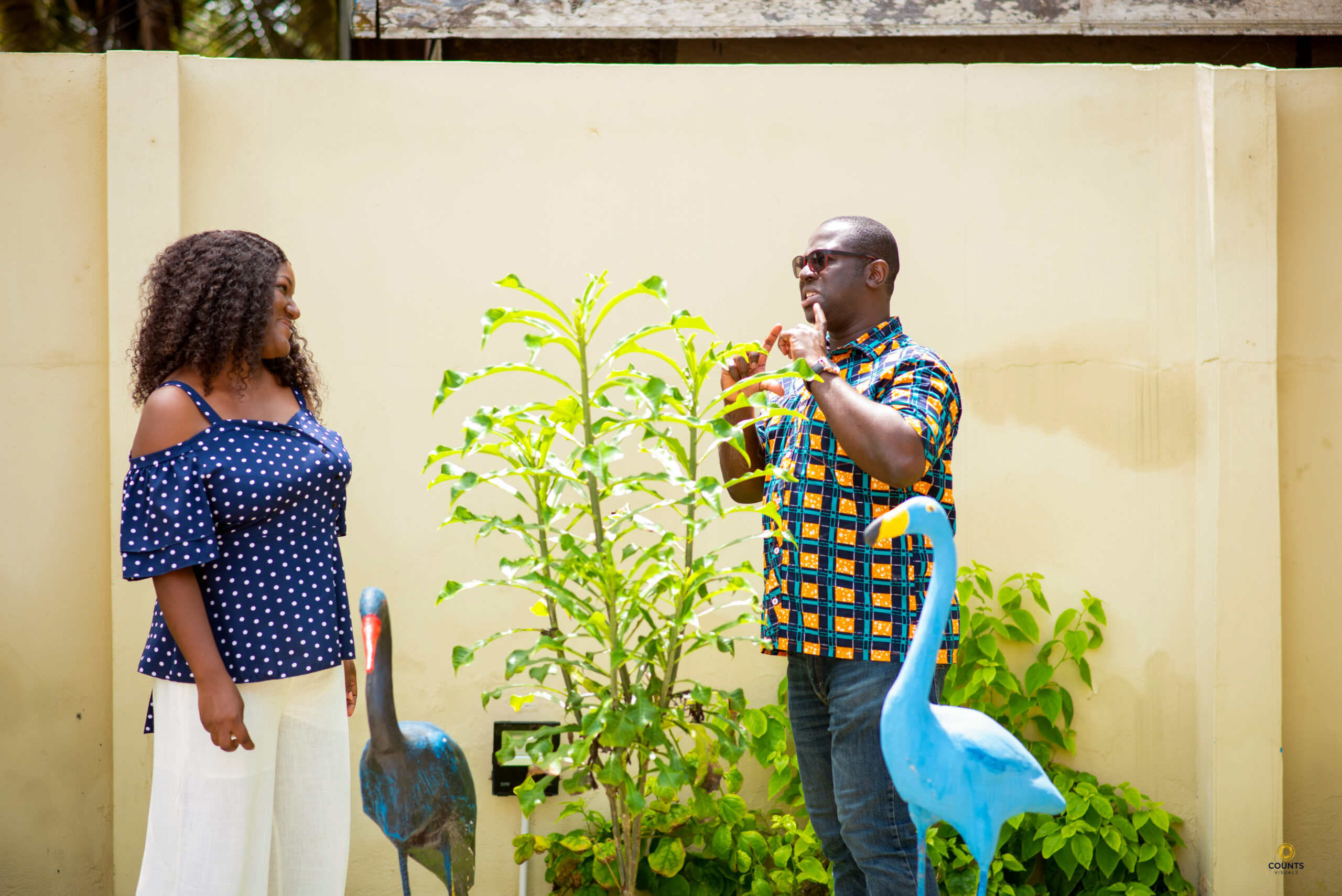
How to Apologize Properly: Seven Succinct & Sturdy Steps.
Let’s talk about apologizing properly. Some people are too prideful to apologize when they err (including me, sometimes). That’s so wrong. But even for those who know they are in the wrong and want to make things right, they often still get making things right wrong.
Imagine my shock, when l was scheduled to have a meeting with one of the top CEOs in Africa and l kept waiting and waiting and waiting and… this person wasn’t showing up. So I signed off from Zoom about 20 minutes later and sent a message: “I hope you’re okay…” etc. etc.
It wasn’t until the next day when this leader sent what was supposed to be an apology. All this person said was, “Apologies.” End of story. What?! I was shockprised. “Is that how to apologize?” I soliloquized. Then l began to understand why only a couple of weeks earlier one of my close friends who is also a top executive of a Ghana Club 100 company shared with me how one of my daughters had totally shocked him. Apparently, she had stepped on him or something of the sort (l forget) but that wasn’t the source of the shock. It was how she apologized. That so astonished him and he said to himself, “I’ve got to learn how to apologize this way.” He is now actually teaching his family that this is how to apologize properly henceforth, when you do something wrong.
This is the way to apologize, for acts of commission (doing what you’re not supposed to do) and omission (not doing what you’re supposed to do) alike:
- Mention the fellow’s name: “Anyele.” “Frankie.” Mentioning a person’s name calls their attention, makes it personal, and connects us to the caller.
- Spell out your offence: “l missed our appointment” or “l did not put the money in the bank like you had asked me to”
- Acknowledge you erred, openly admitting it: “l am wrong”
- Let them know you regret it, verbally articulating it: “I am sorry”
- Ask for their pardon: “Please forgive me.”
- Wait for their response (hopefully they can process right there and then and also give you a response in the affirmative).
- Thank them (no matter the response).
So here’s an illustration of how my CEO friend should’ve apologized: “Yaw. I totally missed our appointment and stood you up. I am wrong. I am sorry. Please forgive me.” This is the way to apologize properly. Just saying “apologies” or a half-hearted “oh sorry” in a huff doesn’t cut it. I am learning to do this better and better because I realize that sometimes when I’m not really really sorry I don’t want to go through this process and certainly don’t want to make the above string of statements.
Giving the other person the opportunity to forgive you by saying “please forgive me” is very empowering for the offended party. It kind of disarms the offender simultaneously too. I hope you’ll practice this and that true transformation will transpire because you are truly deeply sorrowful for what you did wrong even if it’s the slightest thing. Remember, “Ms. ABC, I did XYZ. I am wrong. I am sorry. Please forgive me.” Then await their response and thank them. This is the proper way to apologize. Some even go an extra length to state what they’re going to do to make things right and/or renegotiate the promise.
I am wary of people who are not self-aware enough to recognize they’ve done wrong, whether upon self-reflection or via feedback. And I don’t trust those who won’t say sorry after they’ve been made aware of it, and do it seriously and sincerely. I won’t do business with them because they have low integrity. Of course ,the first layer of integrity is keeping one’s word. But when inadvertently through extenuating circumstances one is unable to, to keep one’s integrity we still need to acknowledge that our integrity is unraveling (not just pretend we never gave our word in the first place) and then still honour our word by apologizing in the above manner and renegotiating.
Apologizing properly is not a trivial matter. It has saved personal relationships, families, communities, organizations and even nations. Let’s begin to take apologizing properly and sincerely seriously: on a personal level, then in our families and communities, ultimately in our corporate world and national life. Now, go and do likewise and teach the people at your workplace, on your team, and even your spouse and cubs to do same. That’s the way to go.
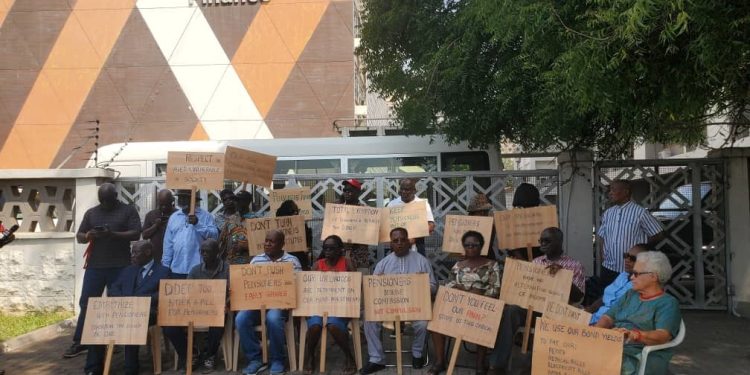
FROM PROFESSOR TO PICKETER: The Lost Generation and the Missing Money
Ghana is neither worth living for nor dying for. That’s how many feel at the moment. Honestly. Think about this: I’ve known Uncle Kweku since his graduate student days on the University of Ghana campus. I was only a lad then. He would later complete his graduate studies, an MPhil in linguistics, and top it up with a PhD from Oregon, USA.
After an illustrious career as an academic (see his brief bio here on the University of Ghana website) he not only retired as a full professor but even served as Pro Vice-Chancellor of Ghana’s premier university. What do we find the illustrious son of Ghana doing these days? Picketing on the premises of Ghana’s Ministry of Finance to demand that the government exempts his and fellow pensioners’ bonds from being sequestered in the dubious Domestic Debt Exchange (DDE) programme. I know for a fact that virtually all of Prof. Kweku Osam’s pension monies are in these bonds. Ei! A former Chief Justice also picketing alongside the other day is reported to have said, “I am over 70 years now. I am no longer government employed, my mouth has been unguarded, and I am talking, and I am saying that we have failed.”
“BACK TO THE FUTURE”
When Uncle Kweku overtly verbalized to the media in an interview on one of the picketing days that he would dissuade his children from ever investing in the Government of Ghana’s financial instruments because “they are risky,” he seemed to have read my mind. Seriously. For while I agree that it is despicable to draw the aged into this DDE debacle and punish pensioners who have planned well for their future and lent their own monies to government to work with, I have an even greater concern for the young people of the country who might take decades to recover from this rude shock. It has taken years to grow a savings and investment culture in Ghana.
As previously started in an earlier article on this matter, “I am pained that, ‘The fathers have eaten sour grapes, and the children’s teeth are set on edge’ (Ezekiel 18:2). For over 20 years now, The HuD Group and I have championed a culture of savings and investments in Ghana, and had the JOY of seeing thousands heeding the call, especially young people.” I recently met one of the young men I used to travel the country with to inspire and teach young people to form investment clubs and start investing. He’s currently the managing director of a major investment company in Ghana. He intimated how this whole DDE disaster made him shed several kilograms over a month, being at the receiving end of verbal and other forms of abuse from frustrated and fearful investors. At the time we spoke, people were withdrawing an average of 100 million Ghana Cedis each day from his outfit. He had already dispatched 2.5 billion Ghana Cedis when we held our conversation.
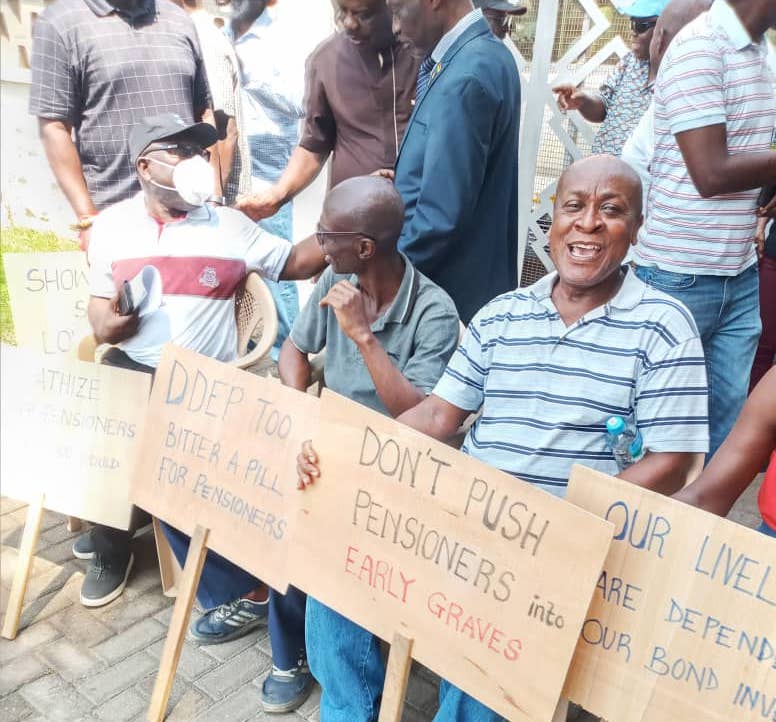
A zoom in on Prof. Kweku Osam, picketing at the Ministry of Finance, with his fellow pension bondholders
BACK TO THE PENSIONERS
So what exactly are we working for? The calibre of pensioners-turned-picketers is disheartening: doctors, engineers, civil servants… If retired professors and chief justices are protesting, what about the no-namers and the many who are too old or too ill to hit the streets? I am privy to a WhatsApp message Prof. Kweku Osam sent that was meant to be just informational, but ended up being very transformational for me:
The last time I took part in a public demonstration against a government of Ghana was in May 1983, as a fresh graduate student. That was when students in the country rose up against Rawlings and his PNDC. Today, God willing, I’ll join fellow Pensioner Bondholders to protest at the Ministry of Finance. The government should leave Pensioner Bondholders alone. Touch not the Pensioner Bondholders.
Think about it: Uncle Kweku began his working life protesting the government. Forty years later, he is ending his working life with yet another anti-government protest. Virtually all his lifesavings is now being held at ransom by a government that has misled and mismanaged her affairs, Covid-19 and Russia-Ukraine notwithstanding. After forty years of wandering in the wilderness between the 1983 protest and the present one on the eve of our sixty-sixth independence commemoration, Ghana itself is a pensioner by age, without much to show for it. We’ve got to do better for our people, old and young alike. Seriously.
Prof. Osam’s generation–my parents’ generation–is the same one the current Finance Minister, Uncle Ken, belongs to. It is the same crop of people who plotted military coup d’etats a generation ago in their youth. Now they won’t exit quietly either, not without a financial coup de grace. With trepidation, dare I call them the lost generation? And they did not only lose themselves and their way, they lost money–theirs and ours.
But to what will my generation and those following rise, having clearly observed that Ghana is not worth living for and Ghana is not worth dying for? That’s how many feel at the moment. Honestly. Think about it.

The Fathers’ Appetites Have Soured the Children’s Futures
The following slightly edited version of this article was first written and posted on Dr. Yaw Perbi’s FaceBook wall on January 31, 2023. At the time, that last day of January was the deadline to tender in eligible Government of Ghana bonds in the controversial Domestic Debt Exchange (DDE). There have been scores of passionate responses to the trending article that we have decided to reproduce it here so people are able to document these for posterity.
I am pained that, ‘The fathers have eaten sour grapes, and the children’s teeth are set on edge’ (Ezekiel 18:2). For over 20 years now, The HuD Group and I have championed a culture of savings and investments in Ghana, and had the JOY of seeing thousands heeding the call, especially young people. Financial Whizzdom, is what we called the campaign.
I wrote three personal finance books and executed a triple launch of Financial Whizzdom, Financial Whizzdom Nuggets (a summary) and Financial Whizzdom through Investment Clubs. It was around that time that Uncle Ken became a mentor to me. He was intrigued that a medical student would be so adept at the world of finance. He not only loaned us some money to finish the project (which we fully paid back within three months or so) but he also passionately spoke at the triple launch. The year was 2004.
Many like-minded people came together to push a savings and investments culture among young people. We traveled the length and breadth of Ghana, doing several seminars and workshops. Medics Investment Club (which really is the first investment club in Ghana per the National Association of Investment Clubs definition) became a model for many who also started their own investment clubs around the country, from university campuses and nursing training colleges to even secondary schools. No wonder I’ve been christened “the grandfather of investment clubs in Ghana.”
The many who wanted to join our investment club at the University of Ghana Medical School but who couldn’t (we had set the maximum for 20) were mobilized into a collective investment scheme we called ‘Mutual Medics.’ At the peak we grew to about 300. We sacrificed student loans, ice cream money and even extra-curricular fun and entertainment to save for our future. Almost none of us have withdrawn the monies we invested almost two decades ago.
Today, January 31, 2023, is the deadline for the trustees of this mutual investment scheme we set up way back in our medical school days to inform Databank for sure whether or not to tender in our eligible bonds in the Government of Ghana’s Domestic Debt Exchange (DDE) debacle. Our fund managers had 70% of the total value of the fund in government bonds, which in normal times and normal places with normal people are supposed to be very low risk, even tempting some advisors to say ‘no risk’ (nothing is ‘no risk,’ not even life itself!).
This DDE is supposed to be a voluntary move but in reality it is a case of “choose your poison.” If you drink this one you will die, if you drink the other one, you will surely die. I am pained for myself, colleagues, fund managers, and the whole investment fraternity in Ghana, especially the younger generation. How did we get here? Indeed, ‘The fathers have eaten sour grapes, and the children’s teeth are set on edge.’
Even more heart-wrenching is that if this should happen under any Finance Minister’s regime, not under the watch of the very mentor who, as far as I know, has spent his whole life building the very financial culture, structures and systems that seem to be now crumbling at his hitherto dextrous hands. The irony.
I am pained. Very much. Whoever has eaten our money, killed our dreams, buried our hope and compelled us to come for unfashionable haircuts that make us look like our misery will have to make it up to us, somehow, even if it is their children or their children’s children. In the mean time, ‘The fathers have eaten sour grapes, and the children’s teeth are set on edge.’ Ah!
~By Dr. Yaw Perbi
Photo credit: Opinion Nigeria
Post Script
We shall do well to document as many of the responses we’ve garnered so far as possible. This issue warrants a national conversation, at the least. A national demonstration for all those equally pained might also be in order to send a strong message to the current government, who in spite of all the pain they are inflicting on the citizenry, have shown no significant sense of regret, repentance or even austerity.
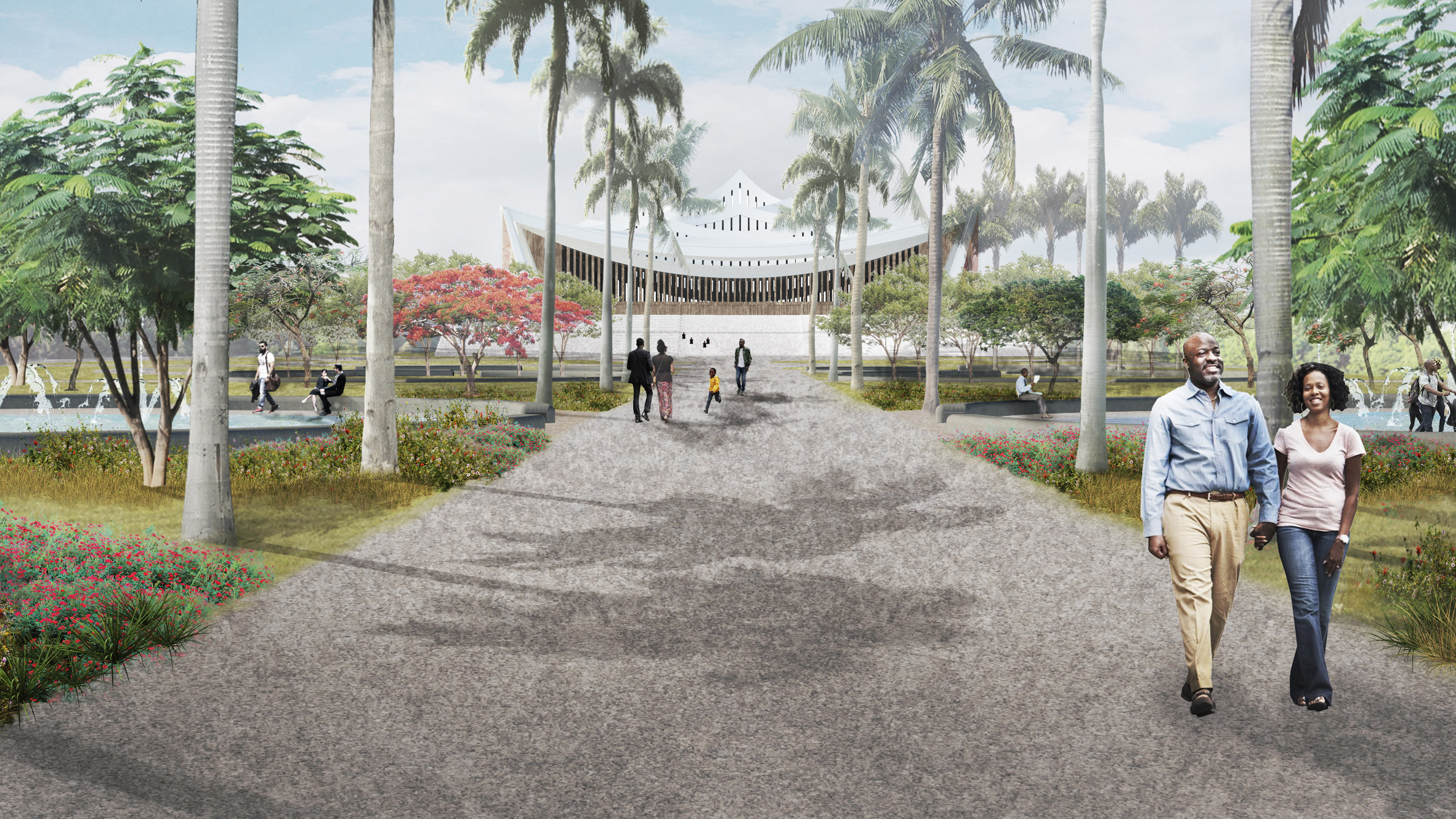
O National Cathedral of Ghana: My Hopes and Fears Have Met in Thee.
In the interest of full disclosure, first of all I am a Bible-believing, Jesus-following, Spirit-filled African Christian. Secondly, at the time of writing, I have no membership of any political party—just a citizen who passionately loves his motherland and has served both major political parties when called upon. Finally, I comment on the National Cathedral of Ghana matter primarily as a missiologist and leadership scholar. These thoughts were largely shared on the Cit FM/TV current affairs programme The Big Issue on 21st January, 2022. The crux of my submission, that the project be halted and audited, was also carried on Citi News Room here.
THE THING THAT I FEARED HAS HAPPENED
My first article on the proposed National Cathedral of Ghana in August 2018 was entitled in a manner that exposed the battle that raged within me upon hearing the president of the Republic of Ghana announce his vision to put up a national cathedral. It was an inquiring heading: “National Cathedral: Vulgar or Virtuous Venture?
In it, I confessed “my unwholly holy initial thoughts, honest-to-God,” sharing my initial skepticism about the project, mainly concerned about it being a mere political scheme to siphon monies, only with a nice religious façade. Secondly, I questioned the prudence of it amidst the poverty and sheer lack of basic infrastructure and public services in a developing country (NB. This was before Covid would hit and make everything that was bad, worse). Thirdly, I was wary of the perilous path of Europe where centuries old grand cathedrals now only stand as emblems of a once-upon-a-time vibrant Christendom while the faith itself is dying today, precipitously. Even then, one need not cross the oceans to note the dangers of religious opulence over pragmatic faith. Just look next door, right across the Ghana border to the near-white elephant of the Notre Dame de La Paix in Yamoussoukro, whose proposed community-impacting hospital as an attachment to assuage the papacy’s guilty conscience is till yet to see the light of day, thirty-two years later.
As I studied the cathedral proposal further, especially as an African missiologist, its merits rose above my cynicism and mounting hopes tamed my fears to the extent that I was willing to give the project a chance, even my support. In fact, not only was I present at the foundation stone-laying, I wrote a cogent trilogy about how even the president might not be fully aware of the extent to which Almighty God may be using him to accomplish His glorious purposes in and through Africa, especially considering this unique moment in history where the once derided “dark continent” now has more Christians than any other continent and will double that lead by 2050, with more Christ followers than the next two continents (Latin America and Europe) combined! In fact, a summary of the trilogy even made its way into the Cathedral’s published magazine.
Over the last couple of years since then, I have found my faith in the project on a slippery slope back to where it first began, with supposed scandal after seeming scandal and allegation upon allegation that rival the corporate sins of the Arthur Andersons and Enrons at the turn of this century (if not making them pale in comparison), that do not befit an edifice for the King of kings. The opacity in the project’s financial dealings, including estimated project costs, eye brow-raising fund transfers and amorphous government seed money, make nonsense of the God who is light, in whom there is no darkness at all. The purpose of this rejoinder is not to dive into each of the smudges and spots on the project but to put on record that while I have enumerated prior at least a dozen reasons this could be a virtuous project, like ‘the greatest man in the East’, for me too, “the thing I greatly feared has come upon me” (see Job 3:25-26). I seek to document for posterity my revised position on the National Cathedral of Ghana for not only are my values being violated, the very faith in whose name this edifice is being erected is endangered.
NOODLED & NUANCED
This cathedral matter is a very nuanced one and thus requires the highest levels of leadership competence, care and character to navigate it. What do I mean? Four things. First of all, the president is not a king; he cannot just pronounce edicts, fiats and decrees at an enlightened citizenship. Secondly, we don’t live in a theocracy, but in a fairly vibrant democracy (although admittedly we are a pseudo secular state with our national anthem and pledge referring to ‘God’). Thirdly, private-public partnerships can be a tricky dance. And finally let’s face it, things are hard socioeconomically right now!
As if all of this is not enough, the president in particular hasn’t shown the kind of great leadership in casting vision (constantly, compellingly, creatively) and galvanizing the people from the grassroots. To make matters worse, the government itself has lost the trust of the Ghanaian people with its economic mismanagement, real and imagined, poor emotional intelligence in matters like this and poor consultation culture–from this cathedral issue through the recent e-levy saga and even current Domestic Debt Exchange debacle.
Then the process itself has been fraught with paucity of information and poor communication, poor governance (really governance 101), low accountability and too much opacity. In fact, in my frustration the other day while preaching on an Ephesians chapter five text about leading and living in the light I bellowed, “Stop the Cathedral in the name of the Lord!”
Don’t get me wrong. There are pluses about this project. Many. Between my initial article and the subsequent trilogy you will easily find a dozen cogent reasons why this could be a virtuous venture, including how the cathedral is more than a building (although the Africanization of it, its tourist attractions and income generation nature per se are all something to write about). The fact that the cathedral has a mandate to be a convenor of national conversation and debate warms my heart.
If the government had kept to its initial promise of providing “just the land” and only “seed capital,” I’ll be at peace. It is for the body of Christ to build this cathedral to the glory of the LORD, but considering the nature of Christianity in our Ghanaian public sphere and the prime place of faith for the African this is a nuanced matter. Any good government would have a keen interest in this matter, hence the sense in situating the NCG in the country’s capital city’s ceremonial core to provide “the missing link” (words of the architect) as a final piece of a national puzzle. Apparently, the other national pieces are all already in place: the people’s place (international conference centre, national sports stadium), the people’s representatives’ place (parliament building and State House), the peoples’ heroes’ place honouring the dead (Osu cemetery and adjoining military cemetery).
Granted, it isn’t everyone who is able to appreciate that we are a building a nation here; not just an eclectic collection of utilitarian infrastructure. That’s how come although we still have children learning under trees we still have national stadia and presidential edifices like Jubilee House and Peduase Lodge. To build or not to build this cathedral is really a nuanced and noodled matter that requires a certain high level leadership that I, honestly, haven’t seen on the horizon.
THIS ISN’T A ZERO SUM GAME
As a missiolgist, I believe that even the president does not fully know or understand the magnitude and implications of his vision. His initial vision may have been personal but vision is often progressive and it is possible He is being used by the Sovereign God in ways the man himself cannot fully comprehend, let alone the masses crying out against this vis-à-vis the impoverished state of the state. In order not to repeat the dozen or so cogent reasons why this project can be worthwhile, I will strongly encourage you to take a look at trilogy 1, the second part and the final installation, all from March 2020.
GOING FORWARD: SEVEN STEPS
1. STOP! STOP! STOP!
This may very much sound and look like the ‘STOP WORK’ in red paint on uncompleted building projects by the Accra Metropolitan Assembly (AMA) yet, I see red flags all over this project that require concomitant red paint markings all over it too. This is not from the AMA this time. Just “we the [Ghanaian] people” saying, “STOP WORK!”
2. AUDIT
Secondly, let us get any of the so-called ‘Big Four’ global auditing firms in the country to do a thorough audit of the NCG secretariat, board of trustees and other associated names like JNS Talent etc.
Sometimes those AMA signs not only read, “Stop Work” but continue with “Produce Permit.” I would say for this cathedral project, in conjunction with step one, let us also “Stop Work and Produce Audit.” The result of the audit will help clarify our next steps—if even this project should continue at all, and if it should, how.
3. CALL FOR CONVERSATIONS AND DEBATE
Let us on purpose have a broader conversation and debate of the best minds and hearts for the way forward. “In the multitude of counselors there is safety,” said the wisest man that ever lived. And this is a sagacious king who could’ve easily ignored the counsel of others. Interestingly, he put up the most magnificent temple in the whole world in his day, for YHWH. Even Africans like the Queen of Sheba travelled long distances to come and see. If we want to see the reverse today, others come from elsewhere to behold the magnificence of the NCG, then we had better consider wise, broad-based consultation.
In my humble opinion, this government has been unbelievably militaristic; so non-consultative! Yet the thing is that even if people do not agree, they will support the project, or at least not be as antagonistic, because they have been seen (recognized) and heard. Conversations and debate will cause the significant groundswell needed for such a massive national venture with international ramifications.
4. GIVE OURSELVES TIME
If from the pause, audit, conversations and debates it becomes apparent that this project should continue, then we must give ourselves time. This cathedral doesn’t have to be built by 2024 and ready for a January 2025 swearing-in. That is precisely part of the problem with this project: the fact that the president is in a hurry to put this up while he is in office.
While a sense of urgency is good, undue pressure because of time crunches leads to many mistakes and often unethical behaviour, no matter how hitherto virtuous one’s cause. For example, this strange exchange of over two million Ghana Cedis between a whole national project and a private individual’s company obviously happened because apparently the project couldn’t wait for government funds to clear (this issue is under investigation, and rightly so). Besides, things are über hot in the economy right now, Ghana’s caught up in a socioeconomic inferno. It is wisdom to let both the times and tempers cool off.
If this is truly a national cathedral and not H.E. Nana Akufo-Addo’s pet project, then it should stand the test of time by traversing other administrations—perhaps two or even three terms down the line, including opposition parties—and be owned by all and sundry. If is by the good people of Ghana it for the glory of Almighty God, then we are not in a hurry. When we are not in a hurry we can think properly, do things appropriately, follow due process… Time is money and time will save us a lot of money—and a multitude mistakes.
5. TRANSPARENCY! TRANSPARENCY! TRANSPARENCY!
“This is the message we have heard from him and declare to you: God is light; in him there is no darkness at all” (1 John 1:5, NIV). Even some corporations have more transparency and better governance than the current supposedly religious project. Anathema! If this is truly an edifice to the Most High God then there cannot be even a hint of inappropriateness and misappropriation. As it stands now, not only has there been too much darkness and opacity surrounding a building that is to be a Lighthouse for the nations; too many allegations and suspected scandals that even some ordinary government projects cannot rival.
My mind goes to another cathedral project’ in ancient times where it was said, “They did not require an accounting from those to whom they gave the money to pay the workers, because they acted with complete honesty” (2 Kings 12:15, emphasis mine). I’m afraid we cannot say this of the NCG people or process so far.
6. LET GOD’S PEOPLE BUILD GOD’S BUILDING
The government of Ghana has done more than enough, giving the land. And way more seed than was my impression at the start of the project. If this sanctuary is really for the LORD then let’s let the Body of Christ in the country build it. And yes, we can! Christians have literally put up thousands of edifices strewn across the length and breadth of the country, ‘from Gambaga to Accra, from Wiawso to Keta.’ Let the Church do this for the glory of Almighty God. We thank the generous government of Ghana for the head start but no more government/tax-payers’ funds, please.
Let God’s people be able to say, like in Nehemiah’s day, “The God of heaven, he will prosper us; therefore we his servants will arise and build.” Whenever God gives a vision, He also makes the provision. But if this venture isn’t of God, then we are on our own; it will be hard.
For a number of great cathedrals that have been built, people have felt so privileged to be a part of the history-making that they have voluntarily given, not just of their substance but of their very selves. Carpenters, masons and other artisans and professionals have offered their services for free, and not the case of exorbitant amounts being paid to the current architect and others. In my opinion, the celebrated architect should feel so privileged to do this for God and country that he does this gratis! You tell me how much we paid the designers of our national flag and presidential stool; or composers of our national anthem and pledge.
7. WORK AS PASSIONATELY ABOUT OUR ‘SOFTWARE’ AS WE ARE ABOUT THIS ‘HARDWARE’
By software I mean our values, our paradigms and attitudes etc. The nation is so full of poor work ethic, corruption, filth (environmental and figurative), incompetence, dishonesty, lack of integrity etc. yet we want to build a magnificent cathedral for God. There is so much grievous poverty in the lives of the majority yet we want to put up this ceremonial and celebratory infrastructure at a cost of $400 million in the heart of Accra. The scriptures are replete with what God requires of us, first and foremost, and it is not so much physical buildings as that our spiritual, social, mental and emotional states reflect His glory; also, that our physical bodies will be hallowed as His temple. So as we are excited about the hardware (physical building of a cathedral), o how I pray that we are equally excited to work on our values, attitudes, morality, ethics, true selves, true faith and integrity. We also ought to disciple our sectors and systems of Ghanaian society so that these reflect a people that believe in a righteous and excellent God, the Most High.
CONCLUSION
Despite the bold vision of the NCG, we haven’t as a people or leadership displayed the kind of competence (eg. vision casting, convincing communication, broad consultation), character (eg. transparency, accountability) and compassion (eg. sensitivity to the present economic plight of the Ghanaian people) that a project of this magnitude demands.
I believe if we took the above seven steps, that should put us in good stead and hopefully lessen the painful memories and bitter aftertaste that this project would otherwise bring us. I do not believe the NCG is an entirely vile venture; but neither will it be entirely virtuous without great leadership in its purpose and process. Repentance and restitution must take place where the audit finds wrong and the best way forward forged as a body politic. The virtues in the idea of a national cathedral can be redeemed and the dead and near-buried hope and glory resurrected. This project can still bring God glory and bestow blessing on not just Ghana but the nations of the world if we would be quick to vanquish the evils that crouch at the foundation and front steps of this edifice. But for now, both my hopes and fears of these past six or so years have come to a head in this embattled National Cathedral of Ghana project.
Post Script
It was heart-warming to find that a couple of the National Cathedral’s Board of Trustees members, namely Archbishop Nicholas Duncan-Williams and Rev. Eastwood Anaba, reiterated my January 21 call above to ‘stop work and produce audit’ barely two days later, January 23, 2023. It was soon followed by a formal press release by the chair of the Board, Rev. Prof. Opoku Onyinah the next day, following a January 23, 2023 Board of Trustees meeting at which they agreed to engage Deloitte, one of the Big Four accounting firms in the world, to carry out an audit.
The hope expressed in the final paragraph of the said press release is mine too: “It is the hope and trust of the Board of the National Cathedral of Ghana that once these nagging issues are satisfactorily dealt with, the public interest and confidence in the project would be restored and rekindled to enable the citizenry to contribute generously to complete the Cathedral to the glory of God.”
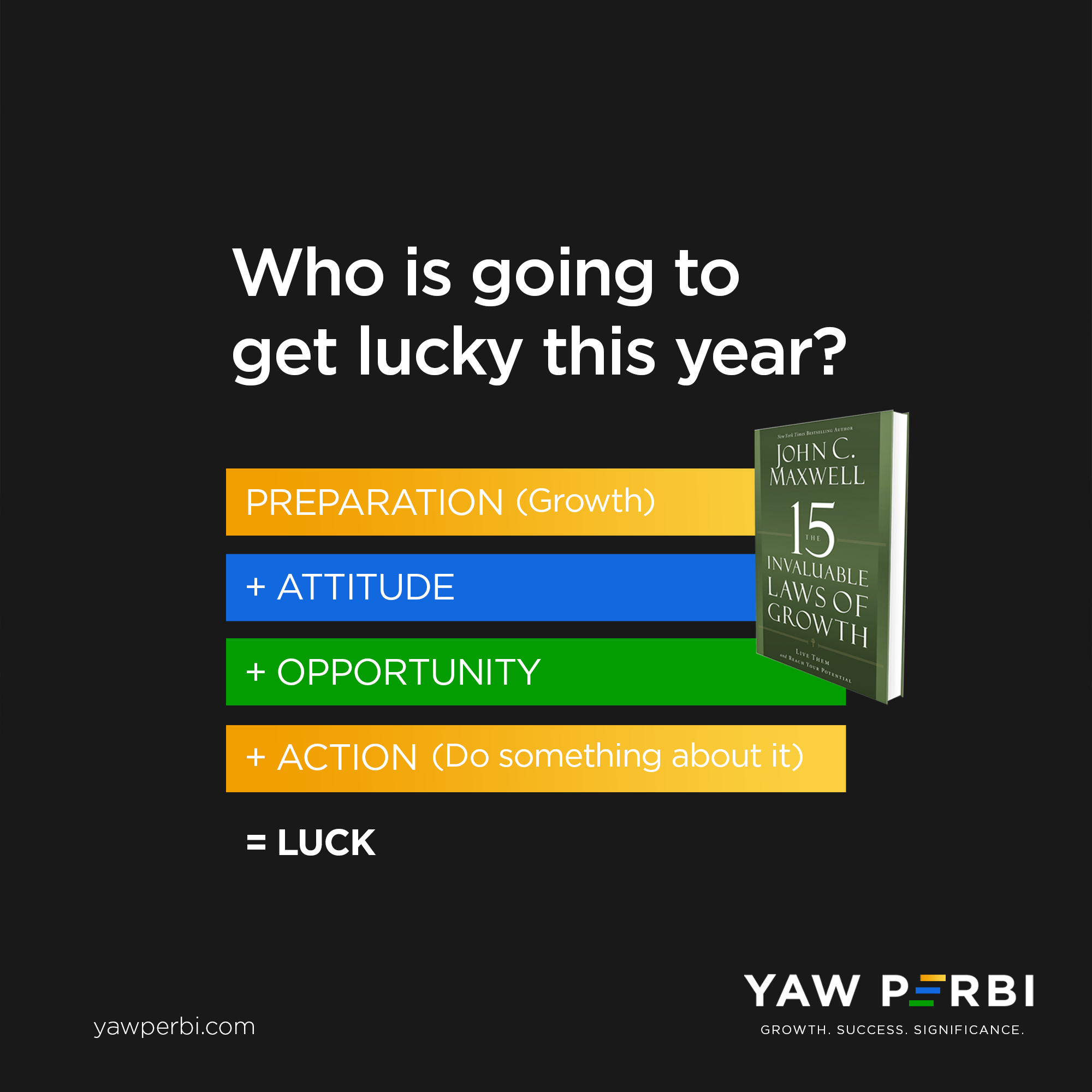
Goals Are Not Dead; You Are, Without Them.
Wow! Thank God for 2023! It’s still a relatively new year and I have been hearing a lot of people say, “I do not make new year resolutions anymore.” Similarly others confess, “I have stopped goal-setting.” Do not make that mistake. Let me tell you why.
First of all, this may sound cliché, but it is true: “if you aim at nothing you will hit it.” Goal setting is a timeless, universal law. It’s a principle. I am of the Covey school of thought that principles and values are not the same because you can choose to value principles or not. That’s your business; but you won’t be spared the consequences of breaking an eternal law.
To illustrate this for those in Ghana presently, because the government is inundated with debt and is at the brink of defaulting in paying coupons and principals of domestic bonds they have instituted a Domestic Debt Exchange programme that is making nonsense of people’s savings and investments. Don’t forget that usually government bonds are so low in risk that investment advisors are often tempted to call them “risk free.” Consequently, I’ve come across people arguing—and you can’t blame them—vehemently inquiring, “What is the point of saving? We should have just spent our monies and enjoyed ourselves.”
But be wary: you cannot determine right laws to rule your life by just based on a one-off, unusual, unfortunate incident. What is going on in Ghana is rare (perhaps only Argentines, Zimbabweans and Jamaicans would understand); totally abnormal. So, one cannot refute the importance of savings and investments, which is a timeless, universal law (principle) just because one bad government has gone broke. In the same way, the fact that you have set goals in the past and it hasn’t worked out for you (or others) does not mean goal-setting doesn’t work.
Let me give you five things (a point per finger) to think about:
(1) GOALS MUST BE SET RIGHT
In the first place, are you setting the goals right? And are you setting the right goals? Are your goals specific? If not, they are not going to work. You can’t seize what you can see. Your goal cannot be fuzzy. Then, is it a stretch goal? Many of us will only get up and run after what really challenges us. Is your goal measurable, qualitatively or quantitatively? If not, one cannot keep score and one sees no point in running around in circles. Is it attainable, realistic? If it isn’t, you won’t even start when you know there is no winning, there’s no point venturing.
How about relevant? If it doesn’t really matter immensely to you, you are not going to live by it, let alone die for it. The goal must be right. If it isn’t important to your life purpose, that you won’t thrive without it or survive without it, you aren’t really going to pursue it. Are your goals time-bound? Whether it is a weekly, monthly, quarterly or annual goal, it not only defines clear parameters but also creates a sense of urgency knowing that one doesn’t have ‘forever’ to accomplish it.
And oh! an essential part of what would be considered setting goals right and setting right goals would be to write/type them down. Many people underestimate the power of converting a metaphysical thought or idea into a physical one on paper or a device, grounding it on firma terra.
(2) NOTHING WORKS, REALLY
People set goals, even if they are done right and they are the right goals, go to sleep and then turn round to blame goal setting for not working. Remember, nothing works unless you work it. Even a car won’t work unless you work it, let alone things like marriage. Nothing works unless you work it, buddy. Of course goals don’t work; only people do! Are you working your goals, working on your goals, working out your goals?
(3) HOW ABOUT YOU YOURSELF?
But the third thing, apart from these first absolutely important duo above, is working on yourself! I keep repeating myself like a broken record and how key it is that the person at the centre of the goal-setting process grows in order to goal. So with every goal one sets, it is helpful to ask oneself: how/where do I need to grow in order to achieve this goal? There’s no successful working out goals if one doesn’t work on the person(s) whose goals they are.
(4) KEEPING TABS
If you’re like me, you may do all the above but just don’t make the time to periodically review how things are going with your goals. I tend to ‘go go go’ and not make the time to sit down on my blessed assurance to evaluate. Many times, it is in evaluating weekly, monthly or quarterly that one realizes things that need to be urgently adjusted or attended to in order for the goal to be hit. Imagine a pilot that doesn’t often do any course correction, they wouldn’t end up where they intended when they set out. These days there are instruments that automatically do the constant monitoring and course correction hence the plane can be left on autopilot. Until such autopilot instruments are invented for life itself, remember there is no way round the management cycle: planning (goal-setting right), implementation (working on yourself and working out your goals) and evaluation.
(5) GOT ACCOUNTABILITY?
A lot of us have no accountability. What are the structures you are putting in place to ensure you live by these goals? Don’t forget, as one professor says, human beings have an incredible capacity to deceive ourselves and that’s why l highly recommend that every one of you gets a coach. I have a coach, I have more than one coach. Get a coach, even if it means paying them. They would help you keep inspired and accountable; helping you keep your integrity to yourself and your goals until they are achieved.
You may also join a Mastermind this year, to find a group of goal-setters-go-getters who can keep each other motivated and mutually accountable. At YAW PERBI we will have Personal Growth, Family Foundations and Financial Whizzdom masterminds this year.
NO OBITUARIES IN 2023, PLEASE
So with just these five points, might you now have an idea why new year resolutions and goal setting in the past haven’t worked for you? Are you sincerely able to check all these boxes: (1) setting goals right and setting right goals, (2) working out your goals, (3) working on yourself, (4) keeping track by periodically evaluating and (5) getting accountability?
Neither goals nor goal setting is dead; rather you are, without them. Align your life and leadership with the timeless, universal laws of the universe. Don’t hurt yourself by kicking against the pricks. Goals and goal setting are not ancient landmarks you can remove and succeed. You will achieve nothing in 2023 without goals and you will have no one but yourself to blame—because you aimed at nothing, and hit it.
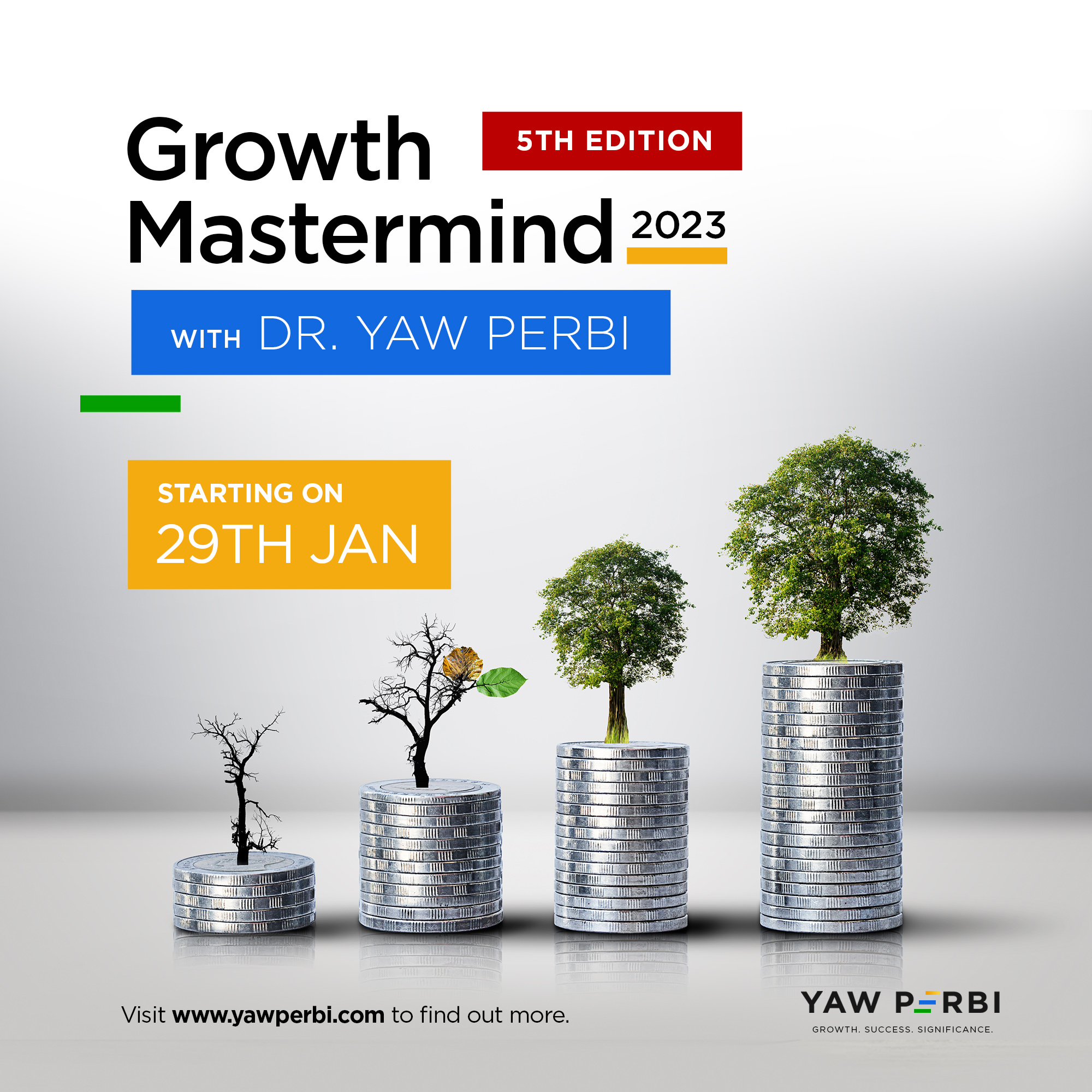
Not Investing in Yourself in Hard Times Doesn’t Make Things Any Better.
Hello! It’s a new year and guess what? It’s a blank cheque and we’ve got to grow to be able to meet our goals. I like to say, you’ve got to grow to goal. In other words, you’ve got to move from who you are today to what you could be in order to score your goals.
My YP Team and I know these are tough economic times and people are scrambling to make ends meet but I can tell you one thing for sure: your refusing to grow or not investing in your personal growth is not going to make things any better. In fact, your guarantee that you are going to come out of this time is actually investing in your personal development and professional growth today.
So, I greatly encourage and highly recommend that you to sign up for this year’s 15 Invaluable Laws of Growth Mastermind. Every year we’ve hosted a cohort, these people have moved, grown! People have changed in their lives. People have literally moved into their own homes, moved countries, moved jobs… Why? Because when you make a move, you grow; and when you grow, you move!
So, sign up today! Sign up now, right here. Even if for some reason you do not have all the money and you want to make an arrangement, we would be flexible because we know times are hard but we want you to grow. After all, if all of us grow, all of us can succeed together. Put in the investment NOW!
I have done that many times, signing up to grow when things have been hard, and I’ve reaped a harvest in the drought. If you know anything about investing then you are aware that we invest all the time–in good times and not-so-good times, when the market is up and when it is down. I would have never owned properties in Canada and the United States if I hadn’t put in nearly $20,000 in learning. I wouldn’t have been a John C. Maxwell Certified Coach if I didn’t put in some $10,000 about 10 years ago. Within months I had used the knowledge, skills and toolkit to recoup all the money back and more!
Guys, it costs something to get something. So, invest in your personal development and professional development today. Sign up for the Growth Mastermind. It’s not a matter of whether or not it will won’t work, it does–without fail. Don’t throw your hands up in the air saying, “I don’t have the money. ” No! Rather ask yourself, “how can I get the investment required because I need this to grow?” Let’s make it work. Yes we can! Yes we will!
Here’s to your growth, success and significance in 2023! Make the move here.

